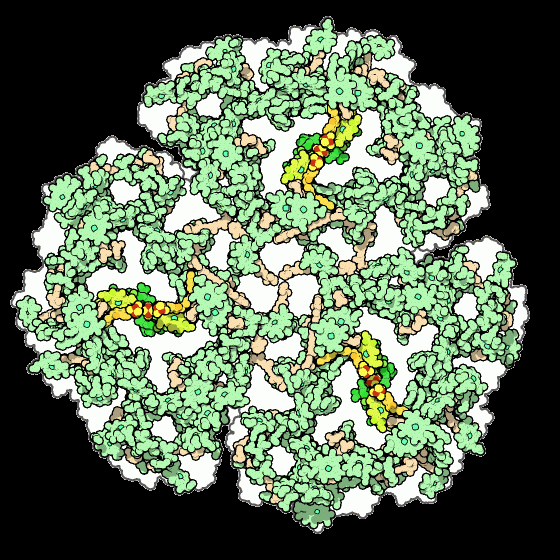I've been thinking a bunch lately about technological increases in productive efficiency, and about some of the different ways that the capitalist pigs scheme to retain control over newfound profits through their manipulation of the means of production.
For example, I remember reading years ago that because of the increase in productivity associated with the modernization of washing machines, modern laundry detergent products are actually way more effective than they need to be (and that their marketing implies). When the bottle tells you to fill up the cap to the marked line, that's actually way more detergent than you need to use for a regular ass load of laundry. Like you literally need somewhere like a third or half of the "recommended" amount of detergent that it says on the bottle lol.
This is because the detergent producers’ profits are tailored to the status quo of their production; if consumption was suddenly halved, the company would have a crisis of overproduction that would eat into their profit margin. obviously this didn't simply happen all at once - but the small increases in efficiency created by the technological boom was not met with an appropriate rise in wages.
I want to start trying to investigate more examples of these situations and products that have been bent to the bourgeoisies' benefit rather than the proles'. I think that trying to become aware of these things is the first step to agitating around concrete ways that people can reclaim value created by these ‘hidden efficiencies,’ as I’ve currently taken to calling them. I'm also very open to suggestions for names that are more clear lol.
What are some hidden efficiencies you’ve noticed in your area of study, profession, or interest?
Probably in agriculture where tons of food are destroyed to keep prices up. Actually that happens in other commodities too. Look up the amount of stuff that Amazon destroyed on daily basis. We do have the technology to meet everyone's material needs and still reduce productive capacity to stave off climate change at least somewhat.
definitely! the way most grocery store food is purely visual is another big one, most stock is just there to fill the shelves so it don't look like vuvuzela. Course, then you get the corporate overloads making employees tamper w dumpster food to make it inedible :kropotkin-shining:
An obscene portion of processing power is used just to spy on you in order to try to guide your choice of identical products, as opposed to what is actually needed for the services you use.
Came to this thread to post this, your phone's battery would last for 3 days if it didn't have to run all it's data collection.
No thoughts, head empty, but I like this question.
Potentially how long most smartphones would actually last if you could swap out the batteries.
:thinking-about-it:
There’s a reason that cell phone companies don’t finance any of the repairable smartphones
this is defo the sort of stuff that I'm thinking of! like, the hidden costs for products that the bourgeoisie passes off onto the consumer, things that will need to eventually change as we shift toward a socialist degrowth
Well it turns out that social media websites are pretty simple bits of software with an entire corporate campus’ worth of advertising tech attached to their backends
There was a Google project to make phones modular and repairable like desktop computers are. Haven't checked in on it in years but I assume it was abandoned.
The Pinephone has a user-replaceable battery, I'm gonna see if it's viable as an Android phone replacement
The Pinephone isn’t a daily driver yet but it’s getting there. Project Aura was dropped because modularity requires abandoning a lot of the optimizations in size and heat that phones have made over the past few decades. And I’m guessing there were issues in getting manufacturers on board and making it profitable as well
Thanks for the info! This will actually save me a pretty good chunk of time.
i always buy phones with the highest possible battery life. been using the same one for 7 years with no problem as a result. no need to swap out the battery if it just lasts forever and takes forever to degrade :think-about-it: i think theyll probably be rebuilding the network infrastructure before i need to replace this thing. 120 dollars for 7 years, id say thats a good deal. but its gonna last longer than that. and i dont have to worry about buying a new battery all the time cause its shorting out
But can you play gatcha games :think-about-it: can you play rwby amity arena
why would i ever do that
also pretty sure you can emulate android on your computer if you really needed it
Ideally you'd also want better software support and optimization, if that was the case probably just short of a decade. If you made phones truely to enhance the life of the user probably another 5 years
i know a libertarian guy that used to live in china and he said all his appliances he brought back are like 1950s american appliances. work amazing, never break, built like a brick house. all of our shit is designed to break here. and people act like china has shoddy equipment, but all the chinese do is sell to american specifications. all their shit is great.
Neat, I didn't know water hardness was a major factor!
I wonder what the energy / efficiency trade-offs are with using more detergent vs. softening one's water.
Depending on how "clean" you feel your clothes need to be when washing with hard well water. I typically use less than the detergent instructions state and my clothes typically come out fine.
Initial installation is pretty pricey. Some softening systems require (or its recommended) that a pre-treatment system is also in place to keep the softening system working like it should. So all sorts of maintenance costs to try to budget for.
Biggest thing that I've come across when looking at well water softening systems is the amount of salt water that you need to find a place to dispose of without creating a tiny toxic waste pit of salt. Salt isn't the only system its just one that seems to be in general use as it pops up first or is mentioned first when doing research. They seem to be a more basic option that doesn't have pre-treatment systems as a requirement to keep the softening system working properly.
This is all very interesting, thank you for taking the time to answer. Does a system like this usually require electricity or is it all chemical/physical?
Most of the diagrams I've seen for the softening systems show some electrical components.
I was skimming some stuff last night after making that first comment that showed a system that didn't soften the water but make the impurities in the water change in a way that makes it less likely that the impurities will crystalized and leave the residue/hard water scale stuff. From the few minutes of looking at the website, it was didn't have any electrical components.
I haven't looked very closely at reverse osmosis systems but I think they would not need extra electrical components.
Damn this explains why I need so much skin sensitive detergent to get the stank off my undies.
It is insane how hard it is to wash soap off your hands with soft water.
ATMs are literally stuffed with cash that just sits there, that people could be using to buy things
Maybe this is obvious, but the one that I really fixate on is the fact that capitalist competition (such as it is) results in a bunch of engineers developing essentially the same thing multiple times. Like, engineers at both Gillette and Schick designed five-blade razors separately. Pharmaceutical companies are all chasing certain types of drugs, and in all likelihood are sometimes considering candidates that have already been rejected by other companies. Amazon and Walmart have both done (and continue to do) what amounts to central planning, but separately. Proprietary software code results in developers writing functions that have been written many times before by other developers. And on and on.
10000x this. It didn't really hit me until I was dealing with enterprise software vendors, but basically every industry consists of potentially dozens of companies reinventing the wheel between one another constantly so they can market themselves as the most "complete" solution out there. 99% of their engineers' efforts goes into reverse engineering a feature someone else already made or creating some ridiculous new integration with other garbage software so their marketing department has more to work with during sales, while bugfixes and optimization work languishes in eternal limbo because the overworked engineers never have time to address them. The competition almost never derives any new innovations (or at least doesn't make anything that wasn't obvious and inevitable).
And so tens of billions of dollars per industry goes towards redundant engineering and unproductive ends like sales, marketing, HR, administration, etc all because the goal isn't to produce functional software but to generate profits out of thin fucking air no matter how stupid the engine that does so is.
I hate how hard it is to make other people, especially in my industry, see this. How many problems we could actually solve, how many deaths could be prevented, how much more meaningful our work could be if we just consolidated all those industries down to their inevitable monopolies and applied the extra resources to something worthwhile instead.
People actually knowing people in their community. Everyone in capitalism just goes home from their shitty jobs and ignores their kids to watch screens.
I wish I could say there was a good way out of this. I'm not sure if theres anything to be said except that social interaction takes effort and energy and constant work doesn't give you either.
This actually makes sense even outside of the "Trying to get people to use too much" part of it however, since of course you will want to include large amounts of your product when selling your product so people can see what it looks like better.
this is another great example. I remember as a kid debating different toothpaste strategies at sleepovers, whether wetting the toothpaste was wasting it or activating it lmao
Just saying that if the proper amount of toothpaste is pea-sized, I wouldn’t make the nozzle for it that wide
The nozzles used to be smaller, then some marketing fuckwit had the idea to make it bigger so people would use more. Capitalists have of course mythologized the story as a display of creative thinking.
https://blogs.sw.siemens.com/embedded-software/2009/06/18/how-to-sell-more-toothpaste/
Shampoo commercials are like that too, pouring out a whole ass handful
Vacant housing. So much shit is just being held on to for rentals, AirBnB, flipping, or just waiting for it to go up and then reselling.
Light bulbs. https://hackaday.com/2021/01/17/leds-from-dubai-the-royal-lights-you-cant-buy/
Nick Mullen was talking about some old school buses that last forever, thus the company went out of business. I think it was Crown Coach.
Related to your laundry detergent example, the classic example people give of this is toothpaste. Commercials put way too much on the brush in order to make people do that so they have to buy more, but you really only need a tiny bit.
Also related is how modern capitalism made dishwashers worse. Technology Connections did two videos on the topic, the tl;dw being that detergent packs are inferior to liquid/powder detergents because they can only add soap to your dishwasher's prewash or wash but not both (unless you use two), and that the instructions on liquid/powder detergent tell you to use way more than you actually need.
Then there's the Budd Company, an American company that made passenger rail cars that got started in 1912. Their cars were famously sturdy and reliable, so reliable in fact that they went out of business because American cities stopped buying trains and there wasn't much money in repairs. Nowadays there are no American passenger rail cars being made on a permanent basis - a city that wants to add a train service or upgrade their rolling stock usually needs to pay a foreign company to come in, set up a temporary factory, build the trains, and then fire everyone and disappear as soon as the contract is filled.
I enjoy cooking but I'd also be happy if there was a communal cafeteria nearby where I could get good food for cheap or free if I volunteered to cook a couple shifts per week.
"High Resolution audio", is practically useless for the end consumer and a marketing gimmick. There is no music out there that is going to make use of the 144db of dynamic range that 24 bit audio has, and higher sample rates are pointless as humans can't hear above 20kHz. Hell, most people over 30 can't even hear above 16kHz.
This stuff is very useful for producers, but not so much for the end users.
In fact most people will be unable to tell a 192kbps Opus or AAC file from an CD quality FLAC file, even while using high quality headphones or speakers. While FLAC is a great archival format as it's lossless, there's no need to waste space or bandwidth by streaming everything in 24 bit 192kHz FLAC quality from Apple music or Spotify HI-FI. The chances are, you can't tell the difference.
In short, post MP3 modern audio compression formats and algorithms have become so good, that music streaming services and audio companies are capitalising on audiofool stuff to sell "high res audio" versions of their service for more money. By taking advantage of people's bad experiences with MP3 in the early days (MP3 was, and is garbage though). Even though 99.9% of people won't be able to tell the difference between "high res audio", and a decent bitrate compressed AAC or OPUS stream.







